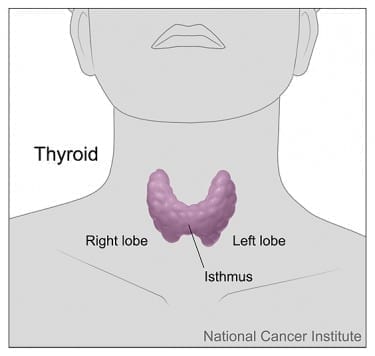
Weighing under an ounce, a butterfly-shaped gland in the lower neck is an unlikely candidate to play such a large role in the human body. But the thyroid controls how fast everything works in your body — from the brain, heart and digestive system to the oil production in skin and lifespan of hair. When disease strikes this little organ, it can mean major problems throughout the rest of your body.
There are two basic types of thyroid disease: hyperthyroidism and hypothyroidism. Hyperthyroidism is when the gland is overactive, causing everything to move too fast. It triggers rapid mood changes, a racing heart rate, diarrhea, oily skin and jittery, shaky movements. Hypothyroidism is just the opposite. It causes a slow heart rate, low blood pressure, fatigue, depression, constipation and dry skin.
“Symptoms of thyroid disease are similar to other conditions, so it becomes very difficult at times to tease out what you’re dealing with,” says Bret Ripley, D.O., chairperson of the Family Medicine Clinic at Des Moines University. “It’s not unusual to be pre-hypothyroid for years before you become bad enough to need medication.”
While not always easy to diagnose, thyroid disease is treatable. Medicine controls the symptoms of hyperthyroidism until the organ heals. When the disease is permanent, a physician will remove all or part of the gland to create hypothyroidism, which is treated with doses of synthetic hormone to return the body to normal activity.
The most common causes of thyroid disease are old age, Graves’ disease and Hashimoto’s thyroiditis. Like other parts of the body, your thyroid wears out and slows as you age, resulting in hypothyroidism. Graves’ disease is when the immune system makes antibodies that attack the thyroid, causing it to produce too much hormone. Over time, production slows to hypothyroid levels. Hashimoto’s thyroiditis is a slow descent into hypothyroidism, where the immune system turns against the thyroid and prevents it from producing enough hormone.
“Thyroid disease is not routinely tested for, but a physician will often check your thyroid gland as part of a routine health exam,” says Dr. Ripley. “People sometimes view their symptoms as signs of getting older and not illness. It can be an easy thing to diagnose as long as you share your symptoms.”

